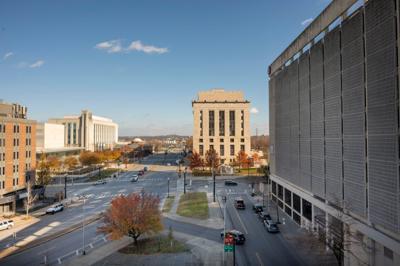The Metro Council will soon vote on the expansion of downtown Nashville's Central Business Improvement District to the Gulch so as to yield an additional tax levy on the area to fund extra services — a move causing tension among some local homelessness advocacy groups.
District 19 Councilmember Jacob Kupin is sponsoring the ordinance to merge the Central Business Improvement District (CBID) with the Gulch Business Improvement District, which he says has the potential to generate an additional $8 million in tax revenue.
In her latest recap, @startleseasily weighs in on a contentious rezoning proposal and the CBID's Gulchward creep
Property owners in the CBID pay an extra tax (and an additional fee of 0.25 percent on certain retail transactions) to cover the costs of services like litter and trash removal, landscaping, district programming and safety patrols, all run by the Nashville Downtown Partnership.
Many businesses operating in both the Gulch and the CBID, and groups such as the Nashville Area Chamber of Commerce, have expressed support for the ordinance.
“The Chamber supports the proposed CBID expansion as it will provide important services that ensure our evolving downtown remains a clean, safe, and well-maintained environment for all,” says the chamber in a statement to Scene sister publication the Nashville Post.
However, critics of the expansion say it could negatively impact the area's homeless population, citing the arrest of 10 unhoused people last year by state troopers connected to the Nashville Downtown Partnership.
Lindsey Krinks, co-founder of Open Table Nashville, a nonprofit advocating for Nashville’s unhoused population, spoke in opposition to the CBID at a council meeting on July 1.
State troopers take in 10 unhoused people around Riverfront Park
“Public funds are being used to privatize public spaces and criminalize people experiencing poverty and homelessness,” Krinks said of the business improvement districts.
At the same meeting, NDP outreach supervisor Antonio Tomlinson supported the expansion of the district.
“We work hard to make sure we build connections, make sure we build a rapport with our homeless population,” Tomlinson said. “We are not forcing them [out]. We’re not treating them mean. We’re trying to find ways that we can help them ... give them a hand up instead of a handout.”
Jeanette Barker, NDP vice president of strategic development, echoes Tomlinson’s message in a statement to the Post. Barker says the NDP provides assistance to unhoused individuals in obtaining IDs, emergency housing and entry into rehab facilities, while helping connect them to family members who can assist with permanent housing.
In regard to the law enforcement services provided through NDP, Barker says a majority of the state troopers’ interactions with the homeless population involves the aforementioned assistance programs.
“Most of the time, any interactions with unhoused individuals lead to connecting the individual with services through outreach as well as connections to local shelters and service providers,” Barker says. “There is not, nor has there ever been, a directive to target unhoused individuals.”
Kupin tells the Post that he agrees there are downtown homelessness issues that need to be addressed.
“But to me, that's not a reason to shut the whole [program] down,” Kupin says.
“I look at the homeless neighbors downtown as constituents,” he adds. “They pay sales taxes and they live in my district. My job is to represent their voices, to represent everybody's voices. And so I come from this not trying to just make the homeless people disappear in any capacity.”
There have been additional concerns raised over budget reporting requirements for the CBID — requirements that the district had not followed in the past. Kupin says Metro is working to address those errors.
The council will take a final vote on the CBID at its July 15 meeting.
This article was first published by our sister publication, the Nashville Post.







